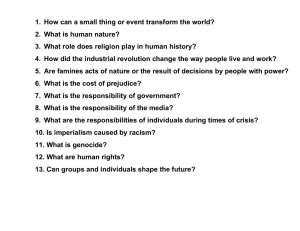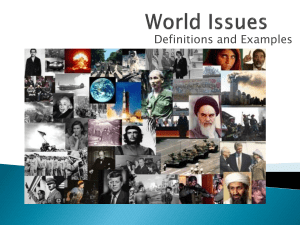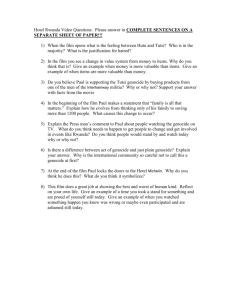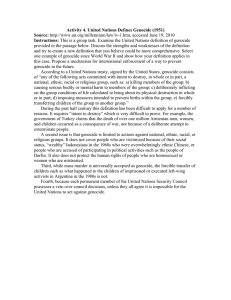Aim: Was British policy in Ireland "genocide"? Objective Standards Do Now Activity:
advertisement
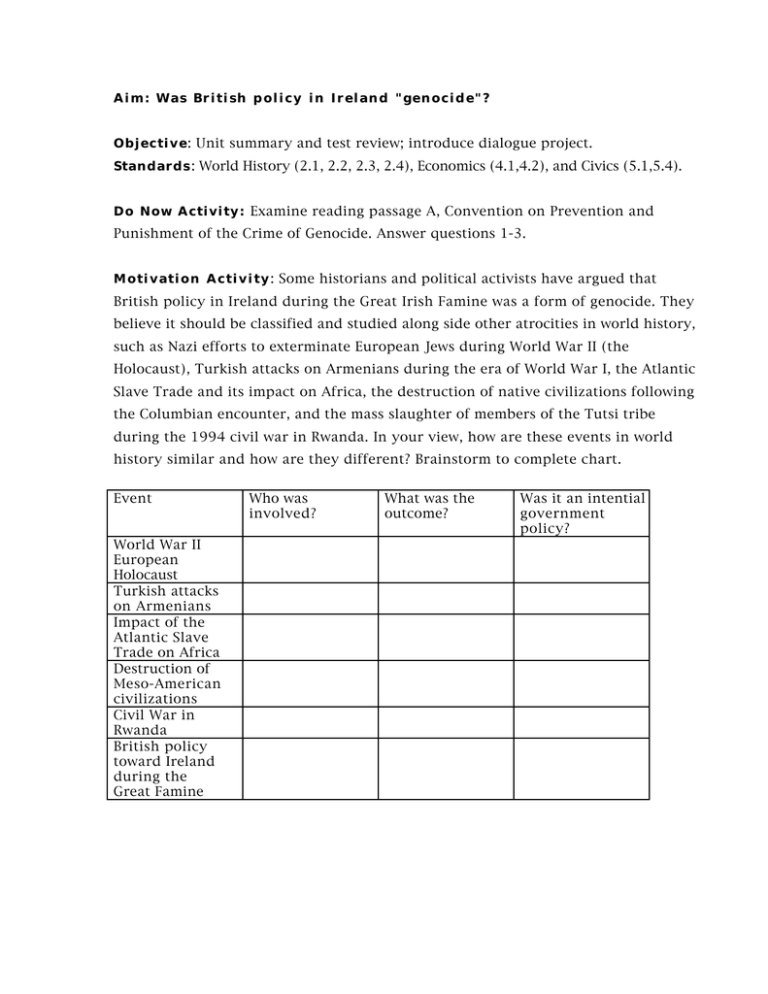
Aim: Was British policy in Ireland "genocide"? Objective: Unit summary and test review; introduce dialogue project. Standards: World History (2.1, 2.2, 2.3, 2.4), Economics (4.1,4.2), and Civics (5.1,5.4). Do Now Activity: Examine reading passage A, Convention on Prevention and Punishment of the Crime of Genocide. Answer questions 1-3. Motivation Activity: Some historians and political activists have argued that British policy in Ireland during the Great Irish Famine was a form of genocide. They believe it should be classified and studied along side other atrocities in world history, such as Nazi efforts to exterminate European Jews during World War II (the Holocaust), Turkish attacks on Armenians during the era of World War I, the Atlantic Slave Trade and its impact on Africa, the destruction of native civilizations following the Columbian encounter, and the mass slaughter of members of the Tutsi tribe during the 1994 civil war in Rwanda. In your view, how are these events in world history similar and how are they different? Brainstorm to complete chart. Event World War II European Holocaust Turkish attacks on Armenians Impact of the Atlantic Slave Trade on Africa Destruction of Meso-American civilizations Civil War in Rwanda British policy toward Ireland during the Great Famine Who was involved? What was the outcome? Was it an intential government policy? Activity: Evaluate the Convention on Prevention and Punishment of the Crime of Genocide. Key Questions 1- This United Nations treaty was signed and went into effect in 1951. In your opinion, what events led to this treaty? Explain. 2- The treaty defines genocide to include a number of different actions as long as they are "committed with intent to destroy, in whole or in part, a national, ethnic, racial or religious group." What type of actions are considered genocide? Why might some critics argue that this definition is too broad? Do you agree with the definition? Why or why not? Activity: Examine passage B, the quote by John Mitchel. Key Questions 1- In this quote, who is Mitchel blaming for conditions in Ireland during the Great Irish Famine? What evidence do you have to support your conclusion? 2- According to the United Nations definition, do benign neglect, "official red tape" and laissez-faire "principles of political economy" constitute legal grounds for a charge of genocide? Explain. Activity: Examine passage C, the quote by Robert Murray. Key Questions 1- What does Murray believe is the problem facing Ireland? 2- What does Murray suggest should be done with Ireland's "surplus" population? 3- In your view, would Murray describe the potato blight as a disaster or as an opportunity? Explain. Summary Question: In your opinion, do British actions in Ireland during the Great Irish Famine constitute genocide? Application: 1- A number of events in recent history, including mass killings in Cambodia during the 1970s, the execution of native leaders in Guatemala in the 1980s, and ethnic conflicts in Rwanda in Africa and Yugoslavia in Europe in the 1990s have been called "genocides." In your opinion, should the term genocide be limited to describe an event on the scale of Nazi efforts to exterminate Europan Jews or can it be legitimately used to describe these other events? Explain. 2- Dialogue Project or Document-based Question (see attached). Worksheet: Was British policy in Ireland "genocide"? A) Convention on Prevention and Punishment of the Crime of Genocide, 1951 According to this United Nations treaty, signed by the United States, genocide consists of "any of the following acts committed with intent to destroy, in whole or in part, a national, ethnic, racial or religious group, such as: a) killing members of the group; b) causing serious bodily or mental harm to members of the group; c) deliberately inflicting on the group conditions of life calculated to bring about its physical destruction in whole or in part; d) imposing measures intended to prevent births within the group; e) forcibly transferring children of the group to another group." Questions 1- According to this treaty, what is the "intent" of an action defined as genocide? 2- According to this treaty, what type of actions can be considered genocide? 3- Based on this definition, what events in world history would you consider genocide? Explain. B) John Mitchel, The Last Conquest of Ireland, 1860 "No sack of Magdeburg, or ravage of the Palatinate ever approached the horror and dislocation to the slaughters done in Ireland by mere official red tape and stationery, and the principles of political economy." C) Robert Murray, Ireland, Its Present Condition and Future Prospects, 1847 "The surplus population of Ireland have been trained precisely for those pursuits (unskilled labor or agricultural) which the unoccupied regions of North American require for their colonization. That surplus is an overwhelming incubus (demon) at home, whether to themselves or others. Remove them and you benefit them in a degree that cannot be estimated. Precisely as you do so, you raise the social condition of those who remain."

